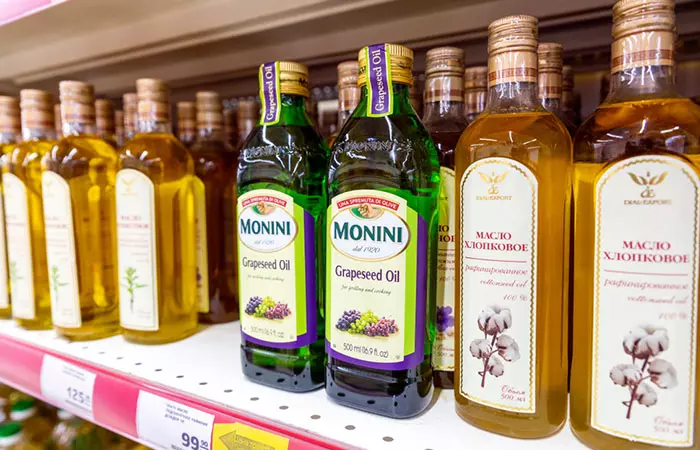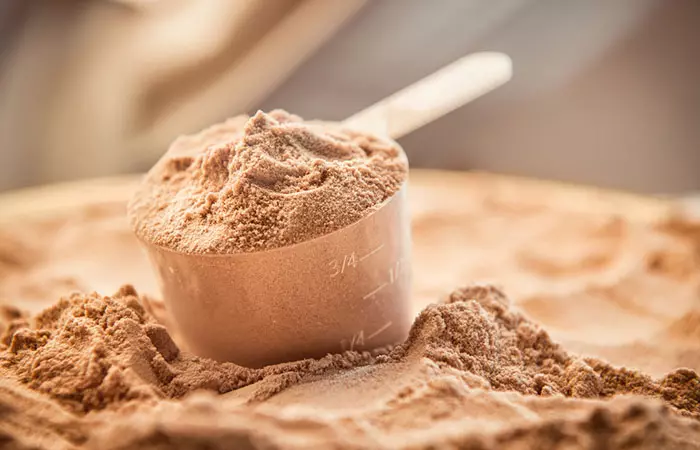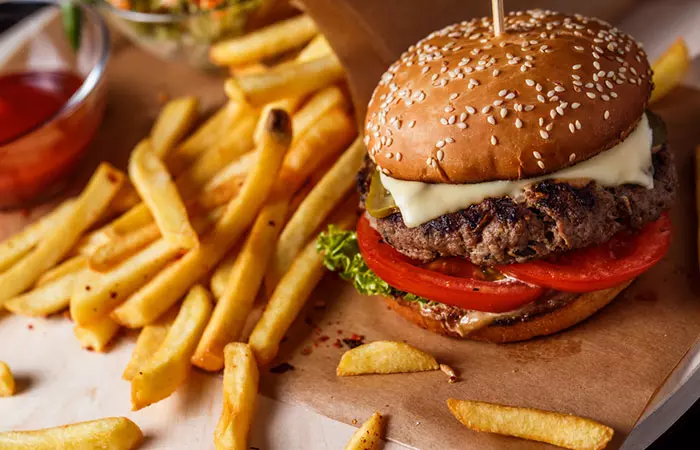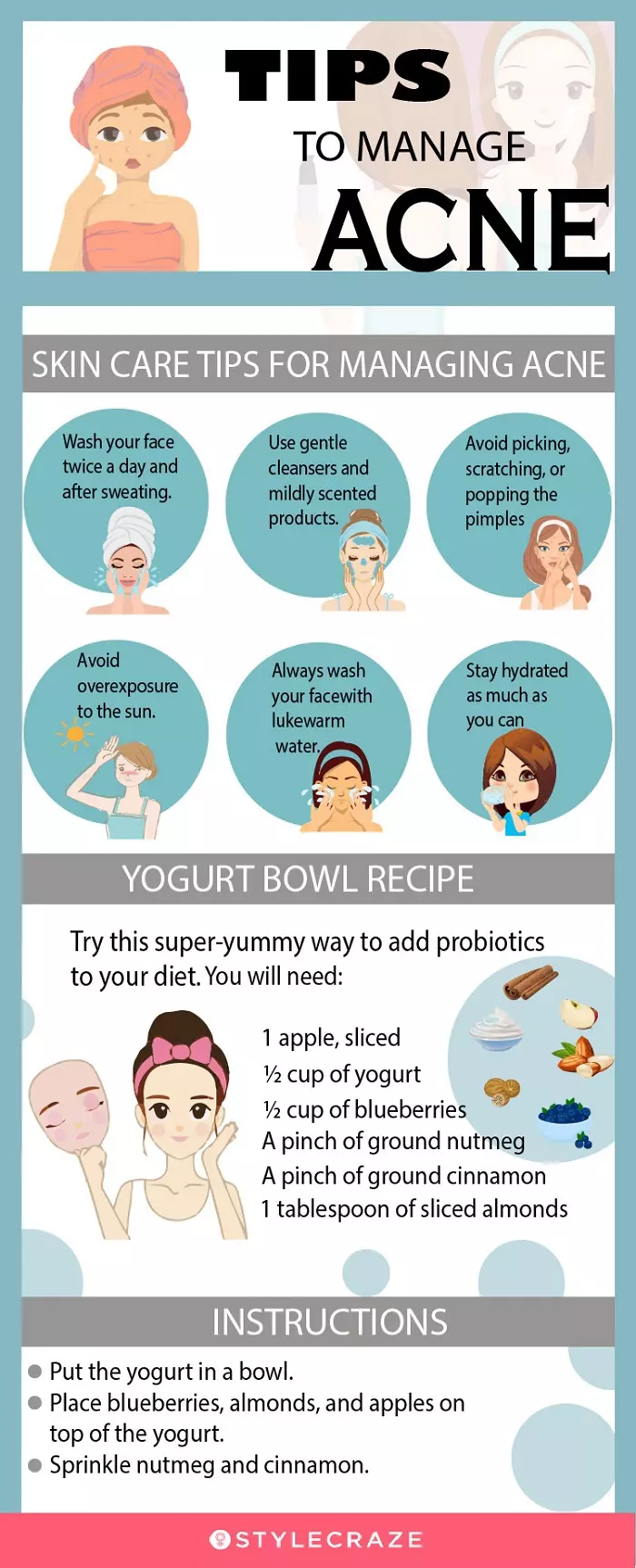While food alone cannot cause acne, certain foods can worsen your existing acne – and more research is required to establish the connection. However, we have listed foods that may trigger acne and worsen the condition. Scroll down to know what foods cause acne. A study conducted in France tried to determine whether diet has any impact on the prevalence of acne in adults. Out of 24,452 participants, 11 324 (46%) reported past or current acne, 3576 (32%) believed diet was a factor, 3503 (31%) believed diet was not a factor, and 4195 (37%) were unsure of whether diet was a factor. It showed that acne can occur 1.43 and 3.90 times more due to carbohydrate and saturated fat intake respectively. While food alone cannot cause acne, certain foods can worsen your existing acne – and more research is required to establish the connection.
List Of Top Foods That Cause Acne
1. Refined Grains And Sugar
A study involving 64 participants with moderate to severe acne found that those with acne consumed a greater amount of carbohydrates. Moreover, these participants with acne also had high amounts of insulin-like growth factor-1 (a hormone that causes high sebumi An oily substance secreted by the sebaceous glands to keep the skin moist and prevent it from drying. production, which usually peaks during pubertyi The series of physical changes, usually between the ages of 10 and 15, through which a child becomes capable of sexual reproduction. ) (2). Another study found that frequent intake of sugar could lead to acne development in adolescentsi The transitional phase of growth and physiological development between childhood and adulthood. (3).
White rice Rice noodles, pasta, and noodles made of white flour Bread, cereals, cakes, pastries, and cookies made of white flour Sugary beverages Sweeteners such as honey, maple syrup, cane sugar
2. Dairy Products
A study reviewing the high school diet of 47,355 women found a positive connection between acne and intake of whole and skimmed milk. Other dairy products, such as cream cheese and cottage cheese, were also found to worsen acne (4). Another case-control study evaluated 44 individuals with acne vulgaris and 44 controls for three months. They found that individuals with acne more often ate food with a high glycemic indexi The value assigned to food based on how quickly and how much it can increase blood glucose levels. load compared to the controls. They drank milk and had ice cream more frequently than the controls (5). A beauty blogger who had a history of severe acne spoke about how milk had been a major culprit. She said, “Cutting cow milk out a few years ago cleared up 90% of my body acne and I always attributed this to the positive effects of reducing my hormone consumption (i).”
3. Fast Food Or Junk Food
A study evaluating the prevalence of acne in adolescents found that those with acne lacked healthy dietary habits. The researchers concluded that frequent intake of fast foods like fatty foods, burgers, sausages, cakes, pastries, and sugar might increase the risk of acne or aggravate it (3).
4. Foods With High Levels of Omega-6 Fats
A typical western diet contains high levels of omega-6 fatty acids and lower levels of omega-3s. Omega-6 fatty acids are found in most of the vegetable and cooking oils, and most processed foods are cooked in these oils (6). You don’t have to eliminate the intake of omega-6 fats. You can control your consumption of processed foods and foods made in vegetable oils. Choose oils that are low in omega-6 fatty acids. These include olive oil, coconut oil, and palm oil. Avoid intake of oils high in omega-6 fatty acids, including sunflower, soybean, and cottonseed oils.
5. Whey Protein Powder
Whey protein is the liquid left behind after the milk is curdled and separated during the cheese-making process. Although whey is rich in amino acids, whey protein has been linked to increased acne in gym-going adolescents who take it. Though the acne (especially on the trunk) could be caused only by perspiration, more research is warranted to establish the causes (7). Milk and milk products can increase IGF-1 receptors and the production of hormones like progesterone and estrogen (8). It is believed that they may contribute to acne, though more research is warranted to understand the mechanism behind it.
6. Non-Organic Meat
Natural or synthetic steroid hormone drugs (including progesterone, estrogen, and testosterone) are often used to increase the growth rate of animals. This is done to get them ready faster for human consumption and has been approved by the FDA (9). Consuming such meats may also trigger acne by increasing the action of androgensi A group of sex hormones that regulate the development and maintenance of male characteristics. and Insulin-like Growth Factor-1 (IGF-1) (10).
7. Caffeine And Alcohol
A study states that coffee reduces insulin sensitivity (11). This means your blood sugar levels stay high for a longer period than usual after you drink coffee. This may increase inflammation and worsen your acne. Another study evaluated the diet of Kitavan people who did not have acne. Their diet involved the minimal intake of coffee, alcohol, sugar, oils, and dairy products (10).
8. Canned Food
Frozen, canned, and pre-cooked meals can be considered processed foods. These often contain added ingredients, such as sweeteners, oils, spices, and preservatives, which are used as flavorings. Ready-to-eat foods and excessively sugary or spicy foods are usually heavily processed and can contribute to acne (10).
9. Fried Food
Potato chips, fries, burgers, and other processed and fried foods can also cause acne. These also include other high-glycemic foods that raise your blood sugar levels quickly, causing inflammatory conditions like acne (10).
10. Energy Drinks
Energy drinks contain high levels of sugar and can increase blood glucose levels (12). In one study, intake of sugar from soft drinks was found to increase acne risk Any sugary drink can increase your risk of acne (13). Hence, So avoid drinking excessive amounts of sugary energy drinks and soft drinks.
11. Chocolate
One common question that has often circulated on the internet is, “does chocolate cause acne?” Now, research indicates that the intake of chocolate is associated with an increase in the severity of acne in people with acne-prone skin (14). A study conducted by Chulalongkorn University, Thailand found that the consumption of 25 grams of 99% dark chocolate for 4 weeks increased the number of acne lesions in acne-prone male subjects (15). Another study published in the Journal of Clinical and Aesthetic Dermatology observed that the consumption of dark chocolate can increase the risk of acne development by promoting bacterial colonization on the surface of facial skin (16). However, it is unclear if these effects alone are sufficient to trigger acne development and more research is warranted in this regard. While none of the studies are conclusive, and there is a need for more research, avoiding certain foods is more likely to help reduce the risk of acne. At the same time, adding certain other foods to your diet can help make your skin clear and healthy.
What To Eat To Keep Your Skin Clear
Here are a few foods that you can add to your diet to keep your skin clear and potentially prevent acne:
1. Foods Rich In Omega-3 Fatty Acids
Unlike omega-6 fatty acids, omega-3 fatty acids have anti-inflammatory properties. Those on a diet high in omega-3 fatty acids were found to have lower levels of acne (17). Hence, eat more foods like salmon, sardines, herring, canola oil, and other fish, like tuna, catfish, shrimps, and clams. These help increase your intake of the omega-3 fats.
2. Probiotics
Probioticsi Live bacteria that live in our body, keep us healthy, and are especially important for gut health. produce antibacterial proteins and inhibit the growth of P. acnes and S.aureus bacteria (18). Both these bacteria are known to cause acne.
3. Green Tea
Green tea contains polyphenolsi A group of chemical compounds that naturally occur in plant-based foods and have antioxidant properties. that act as anti-inflammatory and antimicrobiali Substances that help eliminate microorganisms like bacteria and mold to prevent diseases from spreading. agents. Some evidence shows that these polyphenols help reduce excess sebum production and inhibit the growth of P. acnes (19).
4. Turmeric
Turmeric contains curcumin, a compound responsible for its therapeutic benefits. Whether you take it orally or apply it topically, turmeric can help in the treatment of skin conditions like acne (20).
5. Foods Rich In Vitamins A, D, E, And Zinc
These vitamins help maintain skin health. A deficiency of these essential vitamins could often lead to acne (21, 22, 23). You can consume eggs, broccoli, fatty fish like mackerel and tuna, nuts and seeds, and legumes.
6. The Mediterranean Diet
The Mediterranean diet involves a high intake of proteins, fresh vegetables, whole grains, herbs, spices, seafood, seeds, legumes, and extra virgin olive oil. Foods like cheese, poultry, and eggs are eaten in moderation, while processed foods, refined grains, and sugary beverages are to be excluded completely. Following the Mediterranean diet was found to reduce the risk of acne (24). If you are allergic to gluten you may have millet as a healthy whole-grain option. Diet plays a crucial role in maintaining overall skin health. A holistic approach is necessary to reduce acne and boost skin health. Yes, it can be difficult to make dietary changes, but you can always start slow. Try cutting down on junk food and follow a balanced lifestyle to achieve clearer skin. Do eggs cause acne? Check out the infographic below to know more. Illustration: StyleCraze Design Team No. There is no evidence to prove that eggs cause acne. However, many people may not tolerate eggs and can be allergic to them, which may trigger inflammation. As a result, you may notice acne flare-ups Does acne go away naturally? In most cases, acne goes away naturally at the end of puberty, but some people still have acne in adulthood. Can I eat yogurt if I have acne? While milk may cause acne, no scientific evidence suggests a connection between acne and milk products like yogurt. You may consume yogurt. However, if you notice flare-ups, discontinue consuming it and consult a doctor. At what age does acne stop? Acne usually clears up when you’re in your 20s, but some people may struggle with adult acne even when they are over 30 (25). Does chicken cause acne? No evidence shows that consuming fresh chicken causes acne. However, processed meat, including chicken, beef, and pork, may trigger breakouts (26). Therefore, avoid consuming processed and pre-cooked packaged chicken products. Are you struggling with acne? Check out this video to learn about the 10 foods that aggravate this condition and how your diet can help you achieve clear skin.











